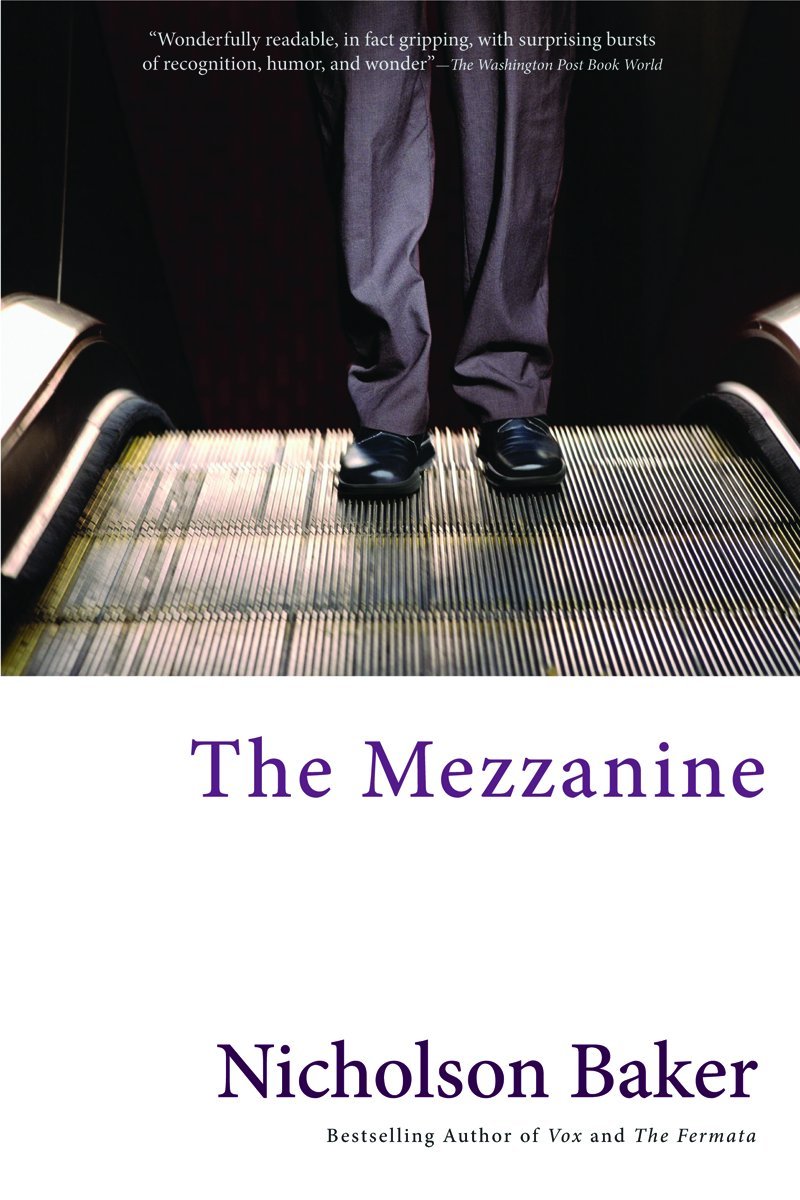Editor’s Note: Todd Hasak-Lowy is the author of four novels, including his newly published first YA novel, Me Being Me Is Exactly as Insane as You Being You. It’s written entirely in lists. We tried to break him of the habit, but we were unsuccessful.
1. The entire novel details its narrator’s thoughts during a single escalator ride, and everyone should read at least one novel about one escalator ride during one’s lifetime.
2. It’s only 135 pages long, but that’s an awful lot of pages for a single escalator ride. That’s really the number one reason to read The Mezzanine, to experience Nicholson Baker’s prose as it microscopes deep, deep down into all manner of things we didn’t think much mattered in the first place: shoelaces, popcorn, straws, ice cube trays, vending machines, and, yes, escalators.
3. My favorite essay to read with my literature students is Viktor Shklovsky’s “Art as Technique.” In this essay, Shklovsky introduces his concept of defamiliarization, of describing a thing that the reader has stopped noticing in a way that helps the reader see it anew. To, in other words, defamiliarize this thing. Or, as Shklovsky marvelously puts it, “to make the stone stony.” Densely populated with these metaphorical stones, The Mezzanine brings the late-twentieth century into exhilarating focus.
4. Part of Baker’s microscoping involves footnotes, some of which go on for pages. And, hey, I like David Foster Wallace as much as the next guy (indeed, I like him much more than nine out of ten next guys), but it seems worth pointing out that Baker’s footnotarific novel was published in 1986, a full ten years before David Foster Wallace’s Infinite Jest.
5. Remarkably, there’s a genuine Bildungsroman humming along right below the surface of this narrative. The bildung here, however, is rather ironic, as the narrator himself explains: “I was the sort of person whose biggest discoveries were likely to be tricks to applying toiletries while fully dressed. I was a man, but I was not nearly the magnitude of man I had hoped I might be.” An ironic Bildungsroman, no doubt, but a refreshingly honest as well. Baker’s protagonist isn’t a hero, but he isn’t one of those nearly as ubiquitous anti-heroes, either. He is (like most of us, frankly) an unhero. He’s just another guy, whose finest trait is seeing himself for exactly who he is, nothing more and nothing less. Yet it is this trait that makes him such a spectacular narrator because he sees his world precisely for what it is as well. This ability allows him to notice and name an endless series of tiny wonders: the “soft, heat-blimped raisins” in raisin toast, “the nuances of signature placement” on a coworker’s birthday card, “rows of paired lozenges intersecting like Venn Diagrams” on a tie, and finally, “the inexhaustible meliorism of the escalator.” One of my measures for a truly great novel is that it changes the way you look at the world once it’s through with you. The Mezzanine passes this test with flying colors.
6. Confession: I taught this to a class of (otherwise) smart, thoughtful undergraduates. As best I could tell, only about 15 percent of them liked it. Yes, I know, this isn’t something I ought to divulge while endorsing this same novel. But this is actually another reason I recommend The Mezzanine as enthusiastically as I do. I once read someone describe Patti Smith’s following like this: If you quantified fandom not merely by the number of fans, but by the intensity of each fan’s affection, then Patti Smith would be the most popular musician in the world. I don’t know if this is true (and I’m not a fan of hers anyway), but I feel that something like this is at work with The Mezzanine. It may not be for you, but if it is, boy oh boy, will it hit you hard. This is no lowest-common-denominator novel, it’s for people who, let’s say, are divisible only by 17 and 383.
7. Which brings me to my last and most personal reason. I started writing fiction not long after reading The Mezzanine. That is, because of it. This novel opened my eyes to two interwoven truths about creative work: first, nothing is trivial if you represent it precisely and passionately. Which was a huge relief to discover, because I thought my whole life was pretty trivial, at least in comparison to the kind of monumental experiences and dramatic lives scattered across most novels. Second, it’s okay to be passionate about things many people find insignificant because it’s the honesty and the passion that matter. So do yourself a favor and pick up The Mezzanine. It’s a short ride in every sense, but one you’ll be glad you took.





